Obsessive-Compulsive Disorder or OCD is often not taken seriously. Individuals assert that they have OCD because of their need to keep their room clean or arrive on time. However, OCD is a serious medical disorder. And there are various signs and symptoms of Obsessive-Compulsive Disorder to show that someone is actually obsessive-compulsive. There is a difference between having schedules you like and giving those routines control of your life. So, if you suspect that somebody might have OCD, it is important to pay attention to the following 10 symptoms of Obsessive-Compulsive Disorder (OCD), and not take OCD lightly. Please seek help if any of the symptoms resonate with you.
Obsessing Over Cleanliness

It is debatable whether Monica of F.R.I.E.N.D.S had OCD. But obsessing over cleanliness is one of the major symptoms of OCD (Obsessive-compulsive disorder). Washing hands after and before eating are sensible hygiene precautions but people with OCD tend to wash their hands so much so that their skin becomes raw. Just like hand washing, cleaning house is often a way that they ease germophobia or feelings of impurity. If somebody is spending hours a day cleaning, then it is perhaps related to OCD and they must seek help. On average, OCD patients can waste up to six hours a day on their obsessions and four hours on their compulsions.
Checking Behavior: a symptom of OCD

Compulsive habits may include checking the same thing over and over again. People suffering from OCD repeatedly check the things that they might associate with harm or danger. This type of compulsion affect almost 30 per cent of people with OCD. While it is normal to double-check something, but if checking interferes with your daily life and routine, it could be a sign of OCD. Some therapists have instances where the patient checks a certain thing a certain number of times. For instance, Jenike has patients who are compelled to check the oven exactly three times. Patients may repeatedly check lights, doors, and electronics appliances.
Organisation

People with OCD take organization to the level of perfectionism. They have a compulsion to make things look just right, be symmetrical and be the right number of items. This fussiness is driven by obsessions about order and symmetry. They may also have superstitions about numbers, colours, or arrangements.
Hoarding

People keep mementoes and other valuable stuff safely. But people with OCD compulsively hoard things that are not that valuable and are never used. This is due to the fear that something bad would happen if they throw away anything. Some will pile items including garbage, waste, etc. They live in deplorable conditions under the belief that they must keep everything. They may also be a miser with their money. It is due to the fact that it is one area of their life that is under their control. They may also begin hoarding free items in order to save money.
Excessive Reassurance Seeking
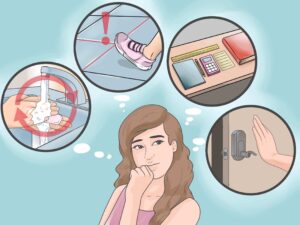
One of the major symptoms of OCD (Obsessive-compulsive Disorder) is that people try to soothe their anxiety by taking the opinion of their friends and relatives. It is a compulsive act done by them in hopes to reduce their anxiety related to an obsession. Though everyone has friends as their supporting system, if you find yourself repeating the same question again and again or if your friends point this out, it may be a sign of OCD. It might sound absurd, but the reassurance that you get from your friends could be the enabler to your obsessiveness.
Obsessive Intrusive Thoughts
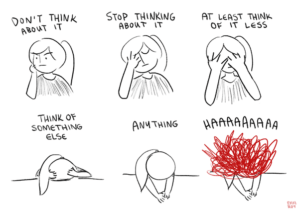
Obsessive thoughts are commonly experienced by people suffering from OCD. The thoughts are persistent and recurrent. The more they try to suppress the thoughts and urges, the stronger they become. In a survey, a list of intrusive thoughts was made and shown to individuals diagnosed with OCD and non-clinical people. Approximately, 90 per cent of the non-clinical sample of people agreed to have experienced some of the intrusive thoughts. But the big difference is these thoughts evoke greater distress for the OCD sample. The sign of OCD is not the thought itself but the reactions that these thoughts evoke in a person.
Depression

OCD may result in another mental illness, depression. Research suggests that two-thirds of people suffering from OCD may experience a major depressive episode.
Eating Disorders
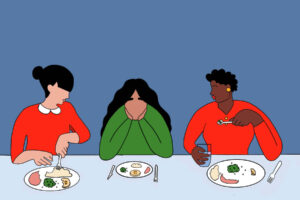
OCD can also have an effect on the eating habits of people. It may cause an individual to change their normal diet. For instance, a person with OCD may stop eating a particular food due to the fear of contamination. They may wash food several times before eating it and prepare it in a particular way.
Repetitive Physical Gestures: Obsessive-compulsive disorder OCD symptom
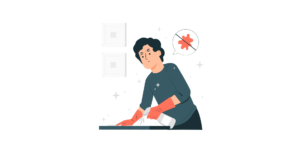
Most symptoms of Obsessive Compulsive Disorder are mental. But there may be physical symptoms as well. Some individuals may have repetitive blinking of the eye, facial expression, shoulder shrugging, or excessive cleaning of the throat.
Dwelling On Relationships: Obsessive-compulsive disorder OCD symptom
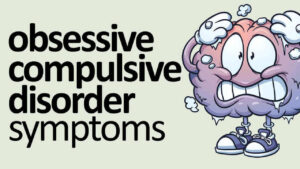
People with OCD may obsessively analyze their relationships with friends, coworkers, romantic partners, and relatives. For instance, they may ponder on some offhand comment at work that had some other meaning, or keep wondering whether a small misunderstanding ruined some relationship. This mindset may reflect a hyperbolic sense of responsibility and difficulty in accepting uncertainty.
Here are 10 tips that will help you to reduce anxiety that may come along with OCD.